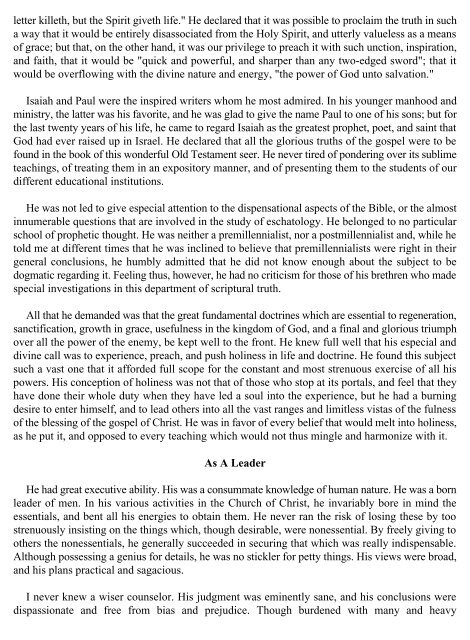Phineas F. Bresee - A Prince In Israel - Media Sabda Org
Phineas F. Bresee - A Prince In Israel - Media Sabda Org
Phineas F. Bresee - A Prince In Israel - Media Sabda Org
Create successful ePaper yourself
Turn your PDF publications into a flip-book with our unique Google optimized e-Paper software.
letter killeth, but the Spirit giveth life." He declared that it was possible to proclaim the truth in such<br />
a way that it would be entirely disassociated from the Holy Spirit, and utterly valueless as a means<br />
of grace; but that, on the other hand, it was our privilege to preach it with such unction, inspiration,<br />
and faith, that it would be "quick and powerful, and sharper than any two-edged sword"; that it<br />
would be overflowing with the divine nature and energy, "the power of God unto salvation."<br />
Isaiah and Paul were the inspired writers whom he most admired. <strong>In</strong> his younger manhood and<br />
ministry, the latter was his favorite, and he was glad to give the name Paul to one of his sons; but for<br />
the last twenty years of his life, he came to regard Isaiah as the greatest prophet, poet, and saint that<br />
God had ever raised up in <strong>Israel</strong>. He declared that all the glorious truths of the gospel were to be<br />
found in the book of this wonderful Old Testament seer. He never tired of pondering over its sublime<br />
teachings, of treating them in an expository manner, and of presenting them to the students of our<br />
different educational institutions.<br />
He was not led to give especial attention to the dispensational aspects of the Bible, or the almost<br />
innumerable questions that are involved in the study of eschatology. He belonged to no particular<br />
school of prophetic thought. He was neither a premillennialist, nor a postmillennialist and, while he<br />
told me at different times that he was inclined to believe that premillennialists were right in their<br />
general conclusions, he humbly admitted that he did not know enough about the subject to be<br />
dogmatic regarding it. Feeling thus, however, he had no criticism for those of his brethren who made<br />
special investigations in this department of scriptural truth.<br />
All that he demanded was that the great fundamental doctrines which are essential to regeneration,<br />
sanctification, growth in grace, usefulness in the kingdom of God, and a final and glorious triumph<br />
over all the power of the enemy, be kept well to the front. He knew full well that his especial and<br />
divine call was to experience, preach, and push holiness in life and doctrine. He found this subject<br />
such a vast one that it afforded full scope for the constant and most strenuous exercise of all his<br />
powers. His conception of holiness was not that of those who stop at its portals, and feel that they<br />
have done their whole duty when they have led a soul into the experience, but he had a burning<br />
desire to enter himself, and to lead others into all the vast ranges and limitless vistas of the fulness<br />
of the blessing of the gospel of Christ. He was in favor of every belief that would melt into holiness,<br />
as he put it, and opposed to every teaching which would not thus mingle and harmonize with it.<br />
As A Leader<br />
He had great executive ability. His was a consummate knowledge of human nature. He was a born<br />
leader of men. <strong>In</strong> his various activities in the Church of Christ, he invariably bore in mind the<br />
essentials, and bent all his energies to obtain them. He never ran the risk of losing these by too<br />
strenuously insisting on the things which, though desirable, were nonessential. By freely giving to<br />
others the nonessentials, he generally succeeded in securing that which was really indispensable.<br />
Although possessing a genius for details, he was no stickler for petty things. His views were broad,<br />
and his plans practical and sagacious.<br />
I never knew a wiser counselor. His judgment was eminently sane, and his conclusions were<br />
dispassionate and free from bias and prejudice. Though burdened with many and heavy
















